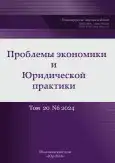Infrastructure Bonds as a Tool for the Development of Capital-intensive Industries
- Authors: Khroni K.O.1,2, Millerman A.S.1
-
Affiliations:
- The Russian Presidential Academy of National Economy and Public Administration
- INTEK-CONSULTING LLC
- Issue: Vol 20, No 6 (2024)
- Pages: 194-202
- Section: Regional and Sectoral Economics
- URL: https://journal-vniispk.ru/2541-8025/article/view/284595
- DOI: https://doi.org/10.33693/2541-8025-2024-20-6-194-202
- EDN: https://elibrary.ru/LDVXYD
- ID: 284595
Cite item
Abstract
The article considers infrastructure bonds as one of the most relevant instruments for financing infrastructure and capital-intensive projects, its significance, state and dynamics in Russia at the present stage. Based on the generalization of foreign experience and the dynamics of the development of the infrastructure bond market, a hypothesis has been formed about the possibility of using this financing tool in various capital-intensive industries, in particular, for the development of the aviation industry. The paper analyzes the conclusions of a number of authors, including the approaches proposed by F. Barbosa (2020) and Della Croce R. Together with Yermo J. (2018), who emphasize the importance of attracting institutional investors for the successful implementation of infrastructure projects, an integrated approach is applied to the study of infrastructure bonds as a tool for the development of capital-intensive industries, and to illustrate the practical application of infrastructure bonds, several examples from different countries are selected and a comparative analysis is carried out. Infrastructure bonds are a promising instrument for financing various capital-intensive projects that require «long» money, however, a low proportion of this source of financing and slowing factors have been identified. The barriers and problems of financing infrastructure projects and directions for expanding the use of this form of financing are outlined. The legal, organizational and administrative measures for the development of the infrastructure bond market in Russia have been identified. The article considers recommendations for practical application and the possibility of subsequent use of the work to stimulate and develop the infrastructure bond market. The implementation of measures to expand the use of this tool will contribute to the intensification of the development of public-private partnerships and concession agreements, as well as more effective solutions to socio-economic problems, infrastructure modernization and, in particular, the development of the aviation industry.
Full Text
##article.viewOnOriginalSite##About the authors
Kirill O. Khroni
The Russian Presidential Academy of National Economy and Public Administration; INTEK-CONSULTING LLC
Author for correspondence.
Email: spiavia@gmail.com
SPIN-code: 6181-1000
post graduate student; CEO
Russian Federation, Moscow; Moscow region, RoshalAlexander S. Millerman
The Russian Presidential Academy of National Economy and Public Administration
Email: millerman-as@ranepa.ru
SPIN-code: 7676-3207
Dr. Sci. (Econ.), Associate Professor, Head of the Department of Finance and Insurance of Institute of Economics, Mathematics and Information Technology
Russian Federation, MoscowReferences
- Averin, N.S. Analysis of the infrastructure bond market in the Russian Federation / N.S. Averin // Financial markets and banks. —2022. —No. 9. —pp. 90–98. EDN: DTJFYS.
- Nikonorova, A.D. Infrastructural bonds: opportunities and risks of application in Russia / A.D. Nikonorova // Vector of Economics. —2020. —№ 6 (48). —P. 53. ISSN: 2500-3666.
- Mirgasimov, D.R. Comparative analysis of the Russian and global sustainable finance market: state and prospects / D.R. Migrasimov. —2023. —No. 6. —pp. 36–41. DOI: https://doi.org/10.17513/fr.43468.
- Pleskachev, Yu.A. Development of infrastructure bonds in Russia / Yu.A. Pleskachev // The economic development of Russia. 2021. No.5. —pp. 40–51. ISSN: 2306-5001. JEL-codes: Е60, Н50, Н54.
- Fedorova, S.V. Infrastructure bonds as a tool for financing public-private partnership projects in the housing and communal services sector S.V. Fedorova // EV. —2023. —№1 (32). —Pp. 116–121. doi: 10.36807/2411-7269-2023-1-32-116-121.
- Flyvbjerg, B. «What You Should Know About Megaprojects» doi: 10.1002/pmj.21409.
- Della Croce, R., Yermo, J. «Institutional Investors and Infrastructure Financing» doi: 10.1787/5K3WH99XGC33-EN.
Supplementary files











